Winners

- Best Film:
- Best Actor:
- Best Actress:
- Best Director:
- Best Screenplay:
- Best Foreign Language Film:
22nd New York Film Critics Circle Awards
January 19, 1957
(announced December 27, 1956)
Around the
World in Eighty Days
The 22nd New York Film Critics Circle Awards, honored the best filmmaking of 1956. [1]


Ernst Ingmar Bergman was a Swedish screenwriter and film and theatre director. Widely considered one of the greatest and most influential film directors of all time, his films have been described as "profoundly personal meditations into the myriad struggles facing the psyche and the soul". Some of his most acclaimed works include The Seventh Seal (1957), Wild Strawberries (1957), Persona (1966), and Fanny and Alexander (1982); these four films were included in the 2012 edition of Sight & Sound's Greatest Films of All Time. Bergman was also ranked No. 8 on the magazine's 2002 "Greatest Directors of All Time" list.

Wild Strawberries is a 1957 Swedish drama film written and directed by Ingmar Bergman. The original Swedish title is Smultronstället, which literally means "the wild strawberry patch" but idiomatically signifies a hidden gem of a place, often with personal or sentimental value, and not widely known. The cast includes Victor Sjöström in his final screen performance as an old man recalling his past, as well as Bergman regulars Bibi Andersson, Ingrid Thulin, and Gunnar Björnstrand. Max von Sydow also appears in a small role.

Roberto Gastone Zeffiro Rossellini was an Italian film director, screenwriter and producer. He was one of the most prominent directors of the Italian neorealist cinema, contributing to the movement with films such as Rome, Open City (1945), Paisan (1946), and Germany, Year Zero (1948). He is also known for his films starring Ingrid Bergman, Stromboli (1950), Europe '51 (1952), Journey to Italy (1954), Fear (1954), and Joan of Arc at the Stake (1954).

Ingrid Bergman was a Swedish actress. With a career spanning five decades, Bergman is often regarded as one of the most influential screen figures in cinematic history. She won numerous accolades, including three Academy Awards, two Primetime Emmy Awards, a Tony Award, four Golden Globe Awards, BAFTA Award and a Volpi Cup. She is one of only four actresses to have received at least three acting Academy Awards. In 1999, the American Film Institute recognised Bergman as the fourth greatest female screen legend of Classic Hollywood Cinema.
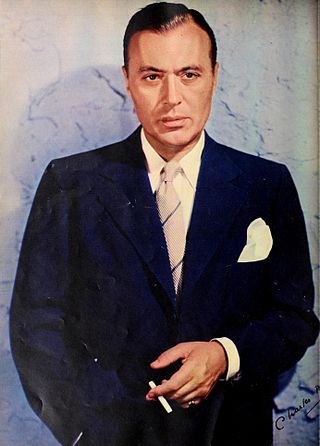
Charles Boyer was a French-American actor who appeared in more than 80 films between 1920 and 1976. After receiving an education in drama, Boyer started on the stage, but he found his success in American films during the 1930s. His memorable performances were among the era's most highly praised, in romantic dramas such as The Garden of Allah (1936), Algiers (1938), and Love Affair (1939), as well as the mystery-thriller Gaslight (1944). He received four Oscar nominations for Best Actor. He also appeared as himself on the CBS sitcom I Love Lucy.
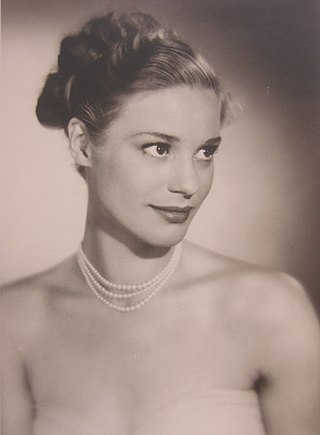
Ingrid Lilian Thulin was a Swedish actress and director who collaborated with filmmaker Ingmar Bergman. She was often cast as harrowing and desperate characters, and earned acclaim from both Swedish and international critics. She won the Cannes Film Festival Award for Best Actress for her performance in Brink of Life (1958) and the inaugural Guldbagge Award for Best Actress in a Leading Role for The Silence (1963), and was nominated for a Best Supporting Actress BAFTA for Cries and Whispers (1972).

Valentina Cortese, sometimes credited as Valentina Cortesa, was an Italian film and theatre actress. In her 50 years spanning career, she appeared in films of Italian and international directors like Michelangelo Antonioni, Federico Fellini, Franco Zeffirelli, François Truffaut, Joseph L. Mankiewicz and others.
Friedel Pia Lindström is a Swedish television journalist, and the first child of actress Ingrid Bergman.
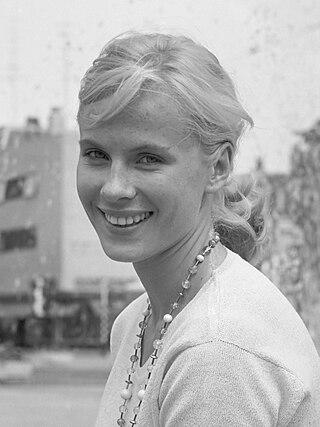
Berit Elisabet Andersson, known professionally as Bibi Andersson, was a Swedish actress who was best known for her frequent collaborations with filmmaker Ingmar Bergman.
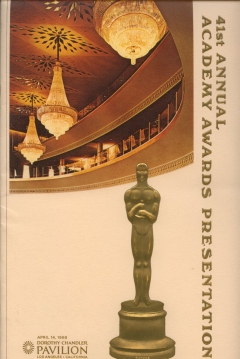
The 41st Academy Awards were presented on April 14, 1969, to honor the films of 1968. They were the first Oscars to be staged at the Dorothy Chandler Pavilion, Los Angeles, and the first with no host since the 11th Academy Awards.
The 38th New York Film Critics Circle Awards, announced on 3 January 1973, honored the best filmmaking of 1972.
The 44th New York Film Critics Circle Awards honored the best filmmaking of 1978. The winners were announced on 20 December 1978 and the awards were given on 28 January 1979.
The 29th Academy Awards were held on March 27, 1957, to honor the films of 1956.

A Woman Called Golda is a 1982 American made-for-television film biopic of Israeli Prime Minister Golda Meir directed by Alan Gibson and starring Ingrid Bergman. It also features Ned Beatty, Franklin Cover, Judy Davis, Anne Jackson, Robert Loggia, Leonard Nimoy, and Jack Thompson.
The 14th Golden Globe Awards, honoring the best in film for 1956 films, were held on February 28, 1957, at the Cocoanut Grove, Ambassador Hotel.
The 11th New York Film Critics Circle Awards, announced on 1 January 1946, honored the best filmmaking of 1945.

Ingrid Bergman was a multilingual, Academy Award-winning actress born in Stockholm, conversant in Swedish, German, English, Italian, and French. She had been preparing for an acting career all her life. After her mother Frieda died when she was three years old, she was raised by her father Justus Samuel Bergman, a professional photographer who encouraged her to pose and act in front of the camera. As a young woman, she was shy, taller than the average women of her generation, and somewhat overweight. Acting allowed her to transcend these constraints, enabling her to transform herself into a character. She first appeared as an uncredited extra in the film Landskamp (1932), and was accepted into the Royal Dramatic Theatre of Stockholm as a scholarship student in 1933.
The 40th New York Film Critics Circle Awards, 26 January 1975, honored the best filmmaking of 1974.
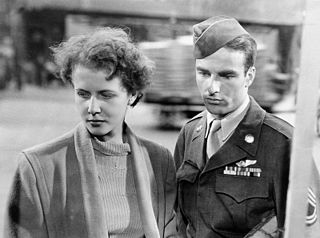
Gerlind Cornell Borchers was a Lithuanian-German actress and singer, active in the late 1940s and 1950s. She is best remembered for her roles opposite Montgomery Clift in The Big Lift (1950) and Errol Flynn and Nat King Cole in Istanbul (1957). She was said to resemble Ingrid Bergman in mid-1950s reviews.